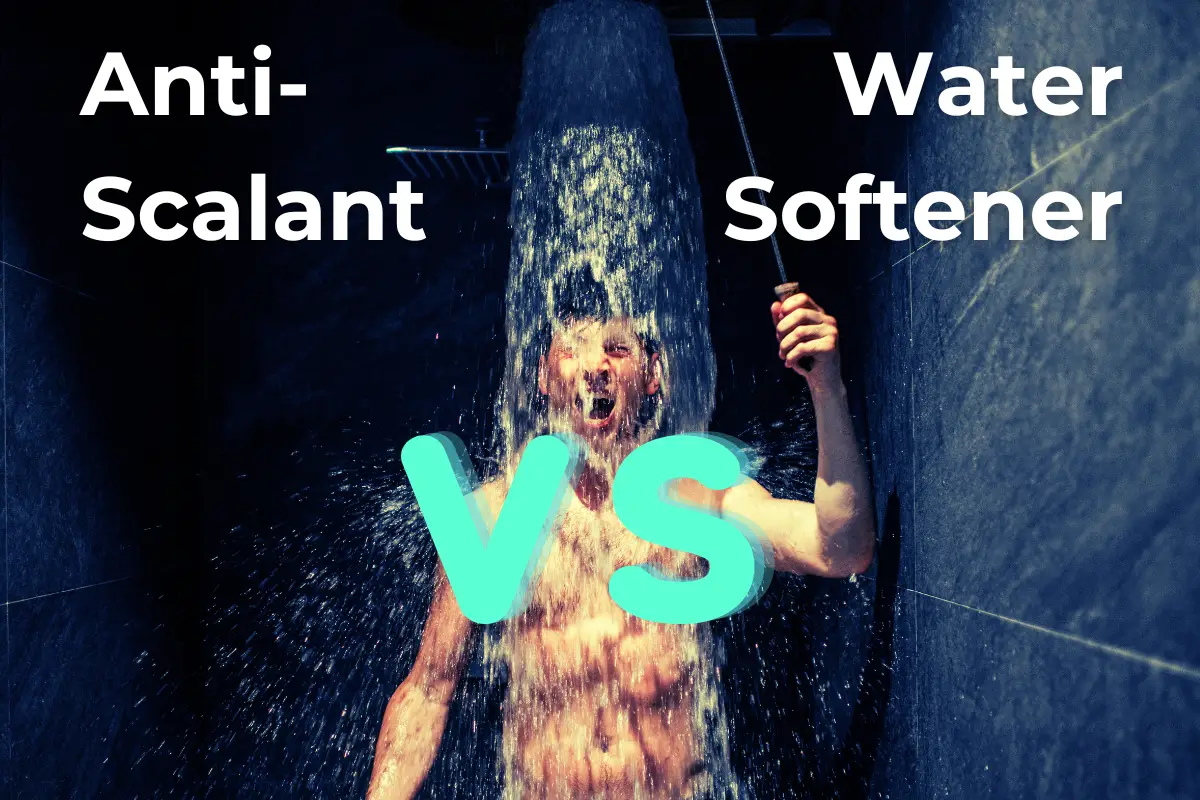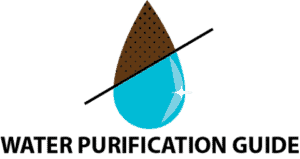Two common solutions to address hard water are antiscalants and water softeners.
In this article, we explore how these options fare when it comes to protecting appliances, how they work, and how much they each costs to set up and maintain.

What are Antiscalants?
Antiscalants protect boilers, hot water systems, reverse osmosis systems and other home appliances. They prevent mineral deposits (scaling) from forming and ensures these systems work efficiently and last longer.
How Do Antiscalants Work?
Antiscalant systems can be used as point-of-entry or point-of-use systems and are typically used in areas with hard water. Antiscalants interfere with the formation of mineral crystals (i.e., stops mineral precipitation), keeping your home scale-free.
Target Minerals for Antiscalants:
Antiscalants are particularly effective against minerals like calcium calcium carbonate, calcium sulfate, and magnesium. They help prevent these minerals from building up in your pipes and appliances.
What are Water Softeners?
Water softeners are devices that primarily remove calcium and magnesium ions from water, converting hard water into soft water. They often use resin beads to accomplish this. A standard whole-house water softener system consists of two main components: a tall tank filled with resin beads for softening the water and a smaller tank, known as the brine tank, that holds a mixture of water and either potassium chloride or salt.
How Do Water Softeners Work?
Resin beads in water softeners exchange sodium ions for calcium and magnesium ions, reducing water hardness.
Target Minerals for Water Softeners:
Water softeners excel at tackling calcium and magnesium ions, the main culprits behind water hardness. They effectively prevent scale buildup in your home’s plumbing and appliances.
Maintenance and Costs
When it comes to maintaining your domestic water treatment system, both antiscalants and water softeners have their unique considerations.
Antiscalants
Antiscalants are known for their low-maintenance nature. Once installed, they typically require minimal attention. Filters usually last about 6 months, but if your water is not very hard they can last much longer than this. This hassle-free maintenance makes antiscalants an attractive option for homeowners that want minimal ongoing effort.
Maintaining an antiscalant system, including filter replacement costs, system cost, and installation costs, varies depending on the type and size of the system. Here’s a breakdown of potential expenses:
System Cost:
Antiscalant systems designed for domestic use can range in price from $100 to $500 or more, depending on the brand, capacity, and features. Smaller systems may cost less, while larger and more advanced systems with additional filtration stages may be at the higher end of the price spectrum.
Installation Costs:
Installation expenses for antiscalant systems can vary based on the complexity of the installation and whether you opt for professional installation. On average, professional installation costs may range from $100 to $300 or more, depending on factors such as plumbing complexity and location. However, most antiscalants are designed as inline systems and are relatively straightforward for DIY installation.
Filter Replacement Costs:
Filter replacement costs can vary based on the type of filters used and how often they need replacement. On average, filter replacements cost around $20 to $50 per year.
Water Softeners
Water softeners can demand a bit more of your time. They often rely on salt or potassium chloride pellets to regenerate their resin beads. This means occasional refilling of the salt tank. Additionally, resin beds may require cleaning or replacement over time, which adds to the maintenance responsibilities. While water softeners offer excellent protection against hardness-related issues, homeowners should be prepared for these maintenance tasks and associated costs:
System Cost:
The cost of purchasing and installing a water softener can be influenced by the volume of water your household consumes. Here’s a breakdown of potential price variations:
- Undersink Systems: Undersink or point-of-use water softeners are generally suitable for smaller households with lower water consumption. The cost of these systems can range from $100 to $500, with installation costs varying based on whether you choose a DIY approach or professional installation.
- Whole House Systems – Low Water Usage: For smaller households with lower water consumption (e.g., 1-2 occupants), whole-house water softeners are available at prices starting around $500 to $1,000. Installation costs may range from $300 to $500 for professional installation.
- Whole House Systems – Moderate to High Water Usage: Larger households with moderate to high water usage (e.g., 3 or more occupants) may require more substantial whole-house water softeners. These systems can cost anywhere from $1,000 to $2,500 or more, depending on capacity and features. Professional installation costs may range from $500 to $1,000, potentially higher for complex installations.
Filter Replacement Costs:
Water softener resin typically requires replacement every 5 to 10 years, but this duration can vary depending on the water’s quality. If the water contains high levels of chlorine, iron, or water hardness, the resin may need replacement as early as 5 years. In essence, the resin’s lifespan hinges on the specific characteristics of the water it treats.
On average, you’re looking at around $80 to $120 for water softener resin but is dependent on the size and type of the system.
Regeneration Process and Water Usage:
Water softeners go through a regeneration process every 7 to 14 days to recharge their resin beads, or after a predetermined amount of water is used. During this process, they flush out the captured calcium and magnesium ions with a brine solution. The amount of water used during regeneration can vary depending on the size and type of the softener. On average, this process can use anywhere from 20 to 50 gallons of water per regeneration cycle.
Salt Usage in Water Softeners:
Salt is a crucial component in water softeners as it plays a pivotal role in cleaning the resin beads in the regeneration process. Here’s a breakdown of salt usage and associated costs:
- Frequency of Salt Replacement: The frequency of salt replacement in water softeners depends on the system’s size, the water hardness, and household water consumption. On average, a standard household may need to replenish salt every 6 to 8 weeks.
- Cost per Bag: The cost of a 40-pound bag of salt can vary depending on the brand and location, but it typically ranges from $5 to $10 per bag. Salt-free systems typically use a potassium replacement, which can cost $50 to $70 per bag.
- Average Cost Per Year: To estimate the annual cost, you have to consider the the number of bags used per year (based on the replacement frequency) and the cost per bag. For example, if you replace a 40-pound bag or regular salt every 7 weeks at an average cost of $7 per bag it’ll cost about $52.00 per year.
Time to Effectiveness:
After installing a water softener, it typically takes around two hours (120 minutes) for the system to start effectively treating your water. During this time, the resin bed needs to fill with softened water, and the system needs to stabilize.
Adjusting Hardness Levels:
Water softeners allow homeowners to adjust the hardness level to their preference. Setting the hardness level too high can lead to more frequent regeneration cycles, which not only consumes more water but also increases the operational costs. It’s essential to strike a balance between water softness and water conservation to manage costs effectively.
Environmental Impact:
Considering the environmental impact of your water treatment choice is essential. Here’s how antiscalants and water softeners stack up:
Antiscalants are generally regarded as more environmentally friendly. They use fewer chemicals compared to water softeners, which require salt for the ion exchange process. Additionally, antiscalants waste less water. Since they prevent mineral buildup without the need for water softening, there’s less water wastage during the regeneration process.
Water softeners, while effective in reducing water hardness, consume more water during regeneration cycles. The discharge of salt-rich brine into the wastewater system can also raise environmental concerns in some regions.
Compatibility with RO Systems:
Both antiscalants and water softeners can be valuable additions to your domestic RO system, but they serve different purposes:
Antiscalants directly protect your RO membrane by preventing mineral scale buildup. They ensure your RO system operates efficiently and extends the lifespan of the membrane.
Water softeners, on the other hand, enhance the overall performance of household appliances and plumbing by reducing the hardness of water. While they don’t target the RO membrane directly, they contribute to a more efficient and effective water treatment system within your home.
Water Quality Benefits:
It’s worth noting that water softeners offer broader water quality benefits beyond scale prevention. Softened water can lead to reduced soap scum, improved lathering in soaps and shampoos, and overall enhanced user experience. Homeowners often appreciate these additional perks that come with softer water.
Choosing the Right System:
Choosing between antiscalants and water softeners for your domestic water use depends on your specific needs, water composition, and budget. If you primarily seek to protect your boiler, hot water system, or reverse osmosis system, antiscalants are an excellent choice, offering efficiency and cost-effectiveness. However, if you desire the broader benefits of softer water throughout your home and are willing to manage the associated maintenance, a water softener might better suit your requirements.
To make an informed decision, consider conducting a water quality test or consulting with a professional. Understanding your water composition and household needs will guide you toward the right choice for maintaining clean and safe water in your home.
Also Read

